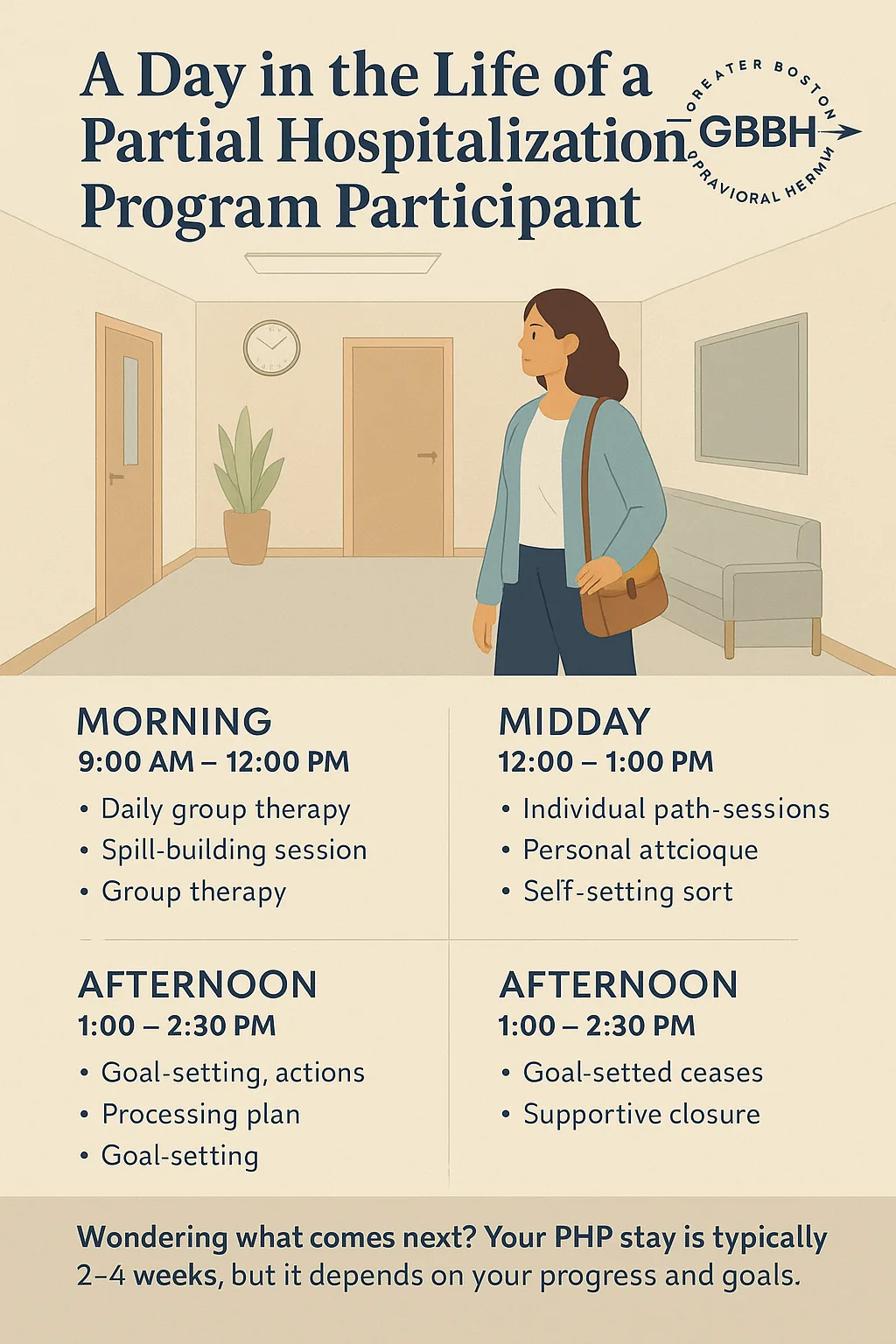You’ve decided it’s time to get help. That first call took guts—and now the next question hits you: What exactly happens in a partial hospitalization program? Will it feel like a hospital? Will you be stuck in endless therapy sessions? Will you feel safe… or trapped?
At Greater Boston Behavioral Health, we hear these questions every day. And here’s the truth: PHP is structured care that feels like breathing room—not confinement. It’s a chance to slow down, recalibrate, and get support in a way that still lets you go home at night. If you’re worried about what treatment looks like, this blog is for you.
What is a Partial Hospitalization Program?
A partial hospitalization program (PHP) is one of the most supportive levels of outpatient mental health care. It’s designed for people who need more than just a weekly therapy appointment, but don’t need to stay overnight in a hospital.
At Greater Boston Behavioral Health, PHP combines:
- Daily group therapy to process emotions and connect with others.
- Weekly individual counseling to focus on your personal goals.
- Skill-building sessions so you can learn real tools for managing anxiety, depression, trauma, and more.
- Daily structure that helps stabilize your routine without isolating you from your life.
Many of our clients start PHP feeling overwhelmed, uncertain, and emotionally exhausted. You don’t have to be “falling apart” to need this level of care. You just need to be ready to feel better—and we’ll guide you from there.
Mornings in PHP: Grounding and Growth
Your day starts around 9:00 AM, but it won’t feel like the sterile, clinical hospital experience you might expect. Instead, you’ll enter a calm, welcoming environment designed to feel safe, not suffocating.
Here’s what a typical morning looks like:
- Check-in: A gentle start where you share how you’re doing, what’s on your mind, or anything pressing.
- Group Therapy: Facilitated by licensed therapists, these sessions help you recognize patterns, process emotions, and build connection. You’ll hear people say things you’ve thought but never said out loud. You’ll realize you’re not as alone as you feared.
- Breaks: Regular pauses to catch your breath, stretch, and reset.
- Skill-Based Sessions: Practical learning—whether it’s grounding techniques, emotion regulation, or boundary setting—that you can actually use in real life.
We know mornings can be tough, especially if you’re carrying anxiety or depression. That’s why the focus is on grounding, routine, and small wins that build momentum.
Midday: Personalized Care for Your Unique Needs
Around midday, PHP shifts into more personalized work.
- Individual Therapy: You’ll meet privately with a clinician at least once a week. This is your safe space to unpack deeper struggles, process past trauma, or work on goals.
- Special Focus Groups: Depending on your needs, you may participate in groups focused on mindfulness, trauma recovery, relationship skills, or coping strategies.
- Psychoeducation: Learn about how mental health works—what’s happening in your brain, how triggers form, and how to regain control.
Looking for partial hospitalization program in Boston, MA? Greater Boston Behavioral Health offers specialized programs tailored to your unique mental health needs. Learn more about our Boston-based services.
Afternoons: Wrapping Up with Clarity
PHP usually wraps up by 2:30 PM, giving you the rest of the day to rest, reflect, or engage in life outside treatment. Before you leave:
- Processing Sessions: You’ll reflect on what came up during the day and set intentions for the evening.
- Goal-Setting: We help you choose small, manageable goals to keep your progress going after you leave the building.
- Supportive Closure: You won’t walk out feeling raw or overwhelmed. Sessions end with practical takeaways to help you carry support home.
PHP vs. Other Mental Health Treatment Options
| Program Type | Time Commitment | Support Level | Who It’s For |
|---|---|---|---|
| Inpatient Care | 24/7, live-in care | Highest, medical supervision | People in crisis needing safety |
| Partial Hospitalization (PHP) | 5-6 hours/day, 5 days/week | High, multiple therapy formats | People needing structured daily support |
| Intensive Outpatient (IOP) | 3-4 hours/day, 3-5 days/week | Moderate, flexible care | People transitioning from PHP or needing focused support |
| Outpatient Therapy | 1 hour/week or as needed | Low, individual sessions | People maintaining progress or managing mild symptoms |
Our partial hospitalization program in Boston gives you the depth of care you need without requiring you to put life completely on pause.
How Long Do People Stay in PHP?
The average stay in PHP at Greater Boston Behavioral Health is 2–4 weeks, but it depends on your progress and goals. Some people stay longer for additional stabilization; others transition sooner to intensive outpatient care (IOP). If you’re near Boston, Dedham, Waltham, Needham Massachusetts, GBBH offers programs with that same approach.
Remember: this isn’t about checking a box—it’s about feeling ready. You’ll work closely with your care team to make sure you’re stepping down to the next phase of care at the right time for you.
Real Talk: What If I Don’t Feel “Sick Enough” for PHP?
You might be surprised how many people tell us this.
Here’s the truth: you don’t need to hit rock bottom to need help. You don’t need to be “sicker” to deserve care. You deserve to feel better before life gets any harder. PHP is designed to catch people in exactly that space—struggling but still standing, hurting but still hopeful.
Frequently Asked Questions About PHP
What does a typical day in PHP look like?
A typical day runs from 9:00 AM to 2:30 PM, with a mix of group therapy, individual therapy, skill-building sessions, and breaks. It’s structured, supportive, and paced to help you build stability without overwhelming you.
Will I be allowed to leave after sessions?
Yes. PHP is outpatient care, meaning you go home after your day ends. You can rest, be with loved ones, or take care of personal tasks in the afternoons and evenings.
Is PHP covered by insurance?
Many insurance plans cover partial hospitalization programs. Our admissions team at Greater Boston Behavioral Health will verify your benefits and work with you to minimize out-of-pocket costs.
Do I have to commit to PHP before I start?
No. You’ll start with an assessment. Together, we’ll decide if PHP is the right fit or if another level of care—like IOP or outpatient therapy—would be more appropriate.
Can I work or go to school while in PHP?
Since PHP takes up most of the day, it’s often difficult to balance with full-time work or classes. Many clients take short-term leave, and we can help with documentation. As you progress, you can transition to IOP, which is more flexible.
This is Your Next Step—Not the Rest of Your Life
PHP isn’t forever. It’s not meant to put your life on hold—it’s meant to help you get your life back. At Greater Boston Behavioral Health, we help you press pause on the chaos so you can reconnect with yourself.
You’ll meet people who understand you, gain skills to manage tough moments, and experience what it’s like to be cared for without judgment.
Call Today—Start Feeling Better Tomorrow
Feeling scared is normal. Taking the first step is brave. But you don’t have to do this alone.
Call (888) 450-3097 or visit Greater Boston Behavioral Health’s partial hospitalization program to learn more about our partial hospitalization program services in Boston, Massachusetts.
Let us help you build a life that feels manageable—one day at a time.


